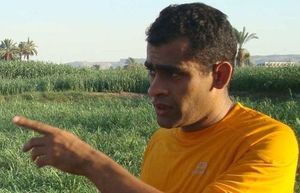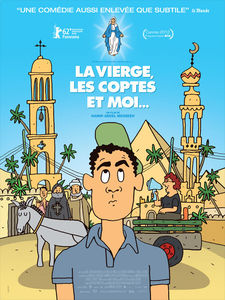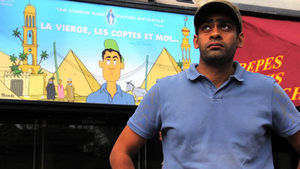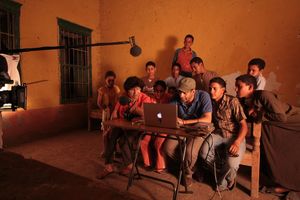Namir Abdel Messeeh: Egyptians now have the power to change the regime
 "To this day, I can not understand how the Egyptians were able to revolt January 25, 2011" This is what Namir Abdel Messeeh, director of "The Virgin, the Copts and Me", says when he is asked if he felt the approach of the revolution.
"To this day, I can not understand how the Egyptians were able to revolt January 25, 2011" This is what Namir Abdel Messeeh, director of "The Virgin, the Copts and Me", says when he is asked if he felt the approach of the revolution.
After two short visits to Egypt post-revolutiont, Namir, whose film won several awards, says there are no portraits of former President Hosni Mubarak and the current President Mohammed Morsi either. He sees that the current economic and social situation is catastrophic, everyone is unhappy. "But I think this is positive. Egyptians speak openly and without fear, and they have the ability to change the regime does not respond to their aspirations. But there is still a long way to go. "
"The Virgin, the Copts and Me" is a film of 82 minutes. It talks about the phenomenon of "the apparition of the Blessed Virgin" from time to time in Egypt and how the Egyptians, Christians and Muslims see this phenomenon, which began in 1968.
The film, which shooting began in 2007 and was completed two months before the revolution of January 25, 2011, covers in an ironic way many issues yhat concerns the Egyptian street, such as social justice, belonging, fear of the authorities, the relationship between Christians and Muslims, women, and freedom of belief and expression. All this through the relationship between Namir and his family, and the situation resulting from the conflict between generations, and the difference between his french culture and the culture of his family in Egypt.
The film was named best documentary fiction at TriBeCa Film Festival in New York, and won the 3rd prize in the Panorama Audience Award at the Berlinale 2012. It also won three awards at the Ismailia International Festival for documentary films and short films, including the award for best documentary. "The Virgin, the Copts and Me", which was presented at the Cannes Film Festival, has reached more than 50,000 admissions in France, despite being exposed in small rooms.
"This film is a search into my Egyptian roots. I left Egypt when I was 18 or 19 years. At the time, I had an identity crisis. I felt French while living in Egypt and Egyptian when I am in France. I have not found my place in the two societies, "said Namir. "At that time, I refused to live in Egypt, where society rejects those who are different in thoughts or beliefs."
 Having grown up, Namir noted that the case is more complicated than the simple difference. "So I looked for an opportunity to return to Egypt and restore relationships with my family. Hence the idea to make a film about Egypt. But what? ".
Having grown up, Namir noted that the case is more complicated than the simple difference. "So I looked for an opportunity to return to Egypt and restore relationships with my family. Hence the idea to make a film about Egypt. But what? ".
"The idea came up during a Christmas party, when a Coptic friend living in France visited us and showed a video on the appearance of the Virgin Mary in a neighborhood in Cairo. I saw nothing in the video, but my mother swore he saw the Blessed Virgin in the band, "said Namir. "It made me think about it the next day, and I said there was a possibility of making a film: There is a video, and people do not see the same thing in this video. So, I presented the idea to producer and I told him that my goal is to understand why my mother and I have not seen the same thing. He said that the idea is good, but what is the film about? Is that it is the Blessed Virgin or is it your mother? My answer was that it is the Blessed Virgin ...Even if the adventure film forced me to bring my mother.
Namir was born in France in 1974. He lived until the age of eighteen between Egypt and France, then moved to Paris. He studied the cinema at the Fémis, where he was graduated in 2000.
In 2005, he directed his first documentary titled "You: Waghuih", which speaks of his father, and the same year he also made his first short film is "something wrong".
In his docu-drama "The Virgin and the Copts and Me", Namir gives the impression that he criticize the situation in Egypt. But he denies it completely. "I tried to understand Egypt and the Egyptians," he says, "You find that the film is full of irony. My idea was to see what happens with astonished eyes. For this, there are scenes or the Egyptians say they are all brothers while other scenes show the opposite. "
But how does he sees Egypt after 15 years of absence?According Namir, the Egyptian is divided into two. "There is a gap between what the Egyptian thinks and what he says, and the problem lies in the personality resulting from this mixture," he says. "The Egyptians are living in the middle of many contradictions ..But the question is how to manage the hypocrisy of himself, whether in religion, politics, etc. .. ?".
While the Egyptian justify this hypocrisy that they are forced to do it, Namir sees it as evidence of the strength of the Egyptian, deprived of all his rights by the Egyptian authorities."It surprised me that no Egyptian ever upset when his bus is delayed for four hours, and thinks it is even normal, and if the bus is on time, then it is a miracle" he said. "I discovered that the Egyptians developed a philosophy in their daily lives, that they must accept all that is negative without getting angry." For Namir, the Egyptian is not revolutionary or rebellious by nature. "He can fit with any situation possible."
 During the 4 years of filming, Namir was shocked by the fact that his french passport has saved several times and if he didn't have it, then maybe he was detained or tortured. "One of my cousins told me that if we were attacked as French, the army and police would have surrounded the village to find the perpetrator in less than 24 hours. Whereas if the attack is against my Egyptian family and 50 people died noonr will move ... It's sad to hear my cousin say that our life is 100 times more precious than their lives in the Egyptian authorities. "
During the 4 years of filming, Namir was shocked by the fact that his french passport has saved several times and if he didn't have it, then maybe he was detained or tortured. "One of my cousins told me that if we were attacked as French, the army and police would have surrounded the village to find the perpetrator in less than 24 hours. Whereas if the attack is against my Egyptian family and 50 people died noonr will move ... It's sad to hear my cousin say that our life is 100 times more precious than their lives in the Egyptian authorities. "
Namir still remembers the moment when he was shooting and a policeman from the Security of the State, the intelligence service of the Ministry of the Interior, came to see him. "He was in civilian clothes, except he had a gun. He asked me who I am and I asked the same question in Arabic. He got angry and asked another officer to prepare a minutes against me and to put me in jail. There I started to speak French and I pulled out my French passport, which saved me. " Namir learned something from this incident he should not show that he is Egyptian in Egypt.
Even if Namir has finished filming two months before the Egyptian revolution, and despite the scenes where people complain about the deteriorating economic and social situation, he never felt that the Egyptians will revolt. "Instead, I was wondering all the time what is this country where people never revolt against the hard life they face, when it annoys me to see all these portraits of Mubarak in the streets ?I thought their fear of the authorities prevent them from rebelling. In addition, they were always observed by the security services. While filming in my village, my cousins were afraid of what I was shooting. And one of them was forced to write a report to the police about what we do and what we will do next, or the impact would be devastating. "
After his return to Egypt, Namir felt the escalating tensions between Muslims and Christians. "I found that hatred dominates the discourse on each side, but I found that much of this hatred is based on rumors.One of my cousins told me horrific stories about what the Muslims do to Christians, and every time when I asked him if he lived or saw it with his own eyes, he told me he heard the history, "he says. "What bothers me most is that this hate speech fate of some places of worship, in both sides, then these places should spread the culture of tolerance and love."
But Namir denies neither the existence of real problems between Christians and Muslims nor the reality of the minority against the majority. "These problems are due to faults of education, education and culture. The extremists are in both sides, and we have to not give them the legitimacy or the chance to represent us. "
Namir was anxious to broadcast his film in Egypt in the hope that the Egyptians like it, but he was by e confronted by strange opinions."There was this Christian who loved the film to the point that he asked me to circulate it in all churches of Egypt. But the same person was adamant that Muslims see it for the simple reason that I admit in the film that I do not believe the stories of the apparition of the Blessed Virgin, "he said. According to Namir, this attitude is due to hate speech, which makes the people from the same community can no longer speak of their differences publicly for fear that the other community mocks them.
Namir addes that before the release of the film in Egypt, he thought it was the Muslims who will attack the film. "Instead, they liked the film. These are Christians who criticized it severely. Worse, a Christian told a Christian TV channel that he will not watch this movie because it defames Christianity. How he knows without seeing ?"He insists. "Another thing surprised me. When I released the film in my village, Christians loved it. So it is in Cairo, where Christians are more educated and more open, the film was attacked.
 In his film, Namir was looking for a Muslim girl to play the role of the Blessed Virgin. He justifies that by his intention to get out of Community framework within which the Egyptians runs all the time. "My goal in the film was to show that the inhabitants of the village, Christians and Muslims are alike in many things. When I looked for a girl to play the role of the Virgin Mary, Christian families, as well as Muslim families, refused that one of their daughters to be filmed for girls not attending men before marriage ... a reason that has nothing to do with religion, but rather with the culture, "he says.
In his film, Namir was looking for a Muslim girl to play the role of the Blessed Virgin. He justifies that by his intention to get out of Community framework within which the Egyptians runs all the time. "My goal in the film was to show that the inhabitants of the village, Christians and Muslims are alike in many things. When I looked for a girl to play the role of the Virgin Mary, Christian families, as well as Muslim families, refused that one of their daughters to be filmed for girls not attending men before marriage ... a reason that has nothing to do with religion, but rather with the culture, "he says.
The film gives the impression that the director's mother is ashamed of her family of farmers. Namir see that all the Egyptians came from fermers families. But when the Egyptians get a very high degree and live in upscale neighborhoods, most of them are trying to forget their origins, especially if they come from a poor background. This has created, he said, a kind of discrimination against the poor. "A priest told me, after seeing the film, it should not show the poor Christians because it will give a bad image to Christians in general ...A speech that is not consistent with the Gospel, "he says. "When you go out to shoot the Egyptian street, and by chance you pass next to a trash can, you will find many people prevent you from shooting because they are convinced that you film the junk in order to give a bad image of Egypt.But what they do to get rid of the trash or even prevent it from being thrown into the street ?The Egyptian mocks his poverty, misery and injustice he faces, but he refuses to be filmed like this ... ", he concluded.

/https%3A%2F%2Fprofilepics.canalblog.com%2Fprofilepics%2F4%2F2%2F426736.jpg)


/https%3A%2F%2Fassets.over-blog.com%2Ft%2Fcedistic%2Fcamera.png)
/https%3A%2F%2Fstorage.canalblog.com%2F60%2F39%2F497575%2F88088089_o.jpg)
/https%3A%2F%2Fstorage.canalblog.com%2F92%2F58%2F497575%2F88087216_o.jpg)
/https%3A%2F%2Fstorage.canalblog.com%2F59%2F61%2F497575%2F84555129_o.jpg)